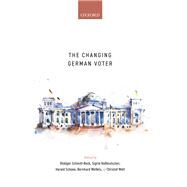The Changing German Voter
, by Schmitt-Beck, Rüdiger; Roßteutscher, Sigrid; Schoen, Harald; Weßels, Bernhard; Wolf, Christof- ISBN: 9780198847519 | 0198847513
- Cover: Hardcover
- Copyright: 10/31/2022
This is an open access title available under the terms of a CC BY-NC-ND 4.0 International licence. It is free to read at Oxford Scholarship Online and offered as a free PDF download from OUP and selected open access locations.
Over the past half century, the behavior of German voters has changed profoundly - at first rather gradually, but during the last decade at accelerated speed. Electoral decision-making has become much more volatile, rendering election outcomes less predictable. Party system fragmentation intensified sharply. The success of the AfD put an end to Germany's exceptionality as one of the few European countries without a strong right-wing populist party. Utilizing a wide range of data compiled by the German Longitudinal Election Study, the book examines changing voters' behavior in the context of changing parties, campaigns, and media during the period of its hitherto most dramatically increased fluidity at the 2009, 2013, and 2017 federal elections. Guided by the notions of realignment and dealignment the study addresses three questions: How did the turbulences that increasingly characterize German electoral politics come about? How did they in turn condition voters' decision-making? How were voters' attitudes and choices affected by situational factors that pertained to the specifics of particular elections? The Changing German Voter demonstrates how traditional cleavages lost their grip on voters and a new socio-cultural line of conflict became the dominant axis of party competition. A series of major crises, but also programmatic shifts of the established parties promoted this development. It led to a segmentation of the party system that pits the right-wing populist AfD against the traditional parties. The book also demonstrates the relevance of coalition preferences, candidate images as well as media and campaign effects for voters' attitudes, beliefs, and preferences.
Over the past half century, the behavior of German voters has changed profoundly - at first rather gradually, but during the last decade at accelerated speed. Electoral decision-making has become much more volatile, rendering election outcomes less predictable. Party system fragmentation intensified sharply. The success of the AfD put an end to Germany's exceptionality as one of the few European countries without a strong right-wing populist party. Utilizing a wide range of data compiled by the German Longitudinal Election Study, the book examines changing voters' behavior in the context of changing parties, campaigns, and media during the period of its hitherto most dramatically increased fluidity at the 2009, 2013, and 2017 federal elections. Guided by the notions of realignment and dealignment the study addresses three questions: How did the turbulences that increasingly characterize German electoral politics come about? How did they in turn condition voters' decision-making? How were voters' attitudes and choices affected by situational factors that pertained to the specifics of particular elections? The Changing German Voter demonstrates how traditional cleavages lost their grip on voters and a new socio-cultural line of conflict became the dominant axis of party competition. A series of major crises, but also programmatic shifts of the established parties promoted this development. It led to a segmentation of the party system that pits the right-wing populist AfD against the traditional parties. The book also demonstrates the relevance of coalition preferences, candidate images as well as media and campaign effects for voters' attitudes, beliefs, and preferences.







